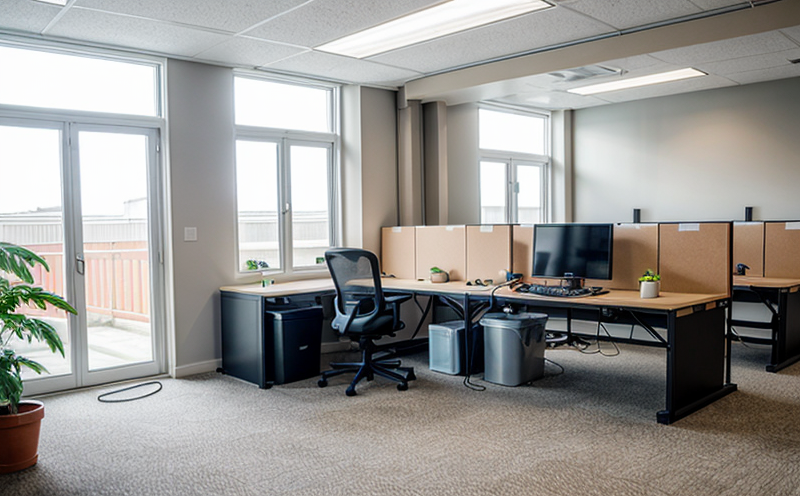ISO 16000-25 Determination of SVOC in Indoor Air by Thermal Desorption Test
The determination of semi-volatile organic compounds (SVOCs) in indoor air is crucial for understanding the potential health risks and environmental impacts associated with various building materials, cleaning agents, and other substances used indoors. This process is governed by ISO 16000-25, which outlines a standardized method to measure SVOCs using thermal desorption coupled with gas chromatography/mass spectrometry (GC/MS).
SVOCs are a class of organic compounds that have low vapor pressure and tend not to remain in the atmosphere for long periods. They can accumulate within indoor environments, posing potential health risks if they exceed safe thresholds. Identifying and quantifying SVOCs helps ensure compliance with regulatory standards and provides valuable data for improving building designs and materials.
The thermal desorption technique involves adsorbing volatile compounds onto a sorbent tube placed in the sampling chamber of an air sampler. The tube is then thermally desorbed, releasing the compounds into a gas chromatograph where they are separated based on their volatility and mass spectrometry that identifies them by molecular weight and fragmentation patterns.
Using this method allows for accurate quantification of SVOCs down to parts per billion (ppb) levels. The precision and accuracy of this test make it an essential tool in ensuring indoor air quality meets international standards such as those set forth by ISO 16000-25. This service is particularly important for industries involved in construction, manufacturing, healthcare facilities, and any other sector where worker or occupant exposure to SVOCs could be a concern.
Our laboratory ensures that all samples are handled with utmost care from collection through analysis. Our team of experts adheres strictly to ISO 16000-25 guidelines while employing advanced instrumentation such as thermal desorption/GC/MS systems, ensuring reliable results every time. By choosing this service, you can trust in receiving accurate data that will help maintain compliance with relevant regulations and improve overall indoor air quality.
The process begins with proper sample collection, which involves placing sorbent tubes in the sampling chamber of an air sampler for a specified period. Once collected, these samples undergo rigorous preprocessing steps including desorption under controlled conditions followed by injection into the GC/MS system. Throughout this entire procedure, strict adherence to ISO 16000-25 ensures consistent and reliable results.
The analysis yields detailed reports that include quantitative values of detected SVOCs along with their respective chemical identities. These insights are invaluable for identifying potential sources of contamination within indoor spaces. Additionally, our team provides comprehensive interpretation services to help clients understand the implications of these findings on human health and environmental impact.
By leveraging this service, businesses can proactively address issues related to SVOCs in indoor air before they escalate into larger problems. This proactive approach not only enhances compliance but also contributes positively towards creating healthier working environments for employees and visitors alike.
Industry Applications
The ISO 16000-25 Determination of SVOC in Indoor Air by Thermal Desorption Test finds applications across various industries due to its importance in ensuring safe indoor air quality. Here are some key sectors where this testing plays a critical role:
- Construction Industry: Ensuring that materials used during construction do not release harmful SVOCs into the environment.
- Manufacturing Facilities: Monitoring for potential leaks or emissions from chemical processes that could affect workers' health.
- Healthcare Facilities: Protecting patients and staff by minimizing exposure to hazardous compounds present in indoor air.
- Educational Institutions: Creating safer learning environments free from harmful pollutants.
- Data Centers: Maintaining optimal conditions for sensitive electronic equipment that could be affected by volatile organic compounds.
- Residential Property Developers: Guaranteeing high-quality living spaces with minimal risk of SVOC exposure.
In each of these areas, the ability to accurately measure and report on SVOC levels is paramount. The ISO 16000-25 standard provides a reliable framework for conducting these analyses, ensuring consistency across different facilities and regions.
Eurolab Advantages
Choosing Eurolab for your ISO 16000-25 Determination of SVOC in Indoor Air by Thermal Desorption Test offers several key advantages:
- Expertise and Experience: Our team comprises highly skilled professionals with extensive experience in environmental testing.
- State-of-the-Art Facilities: Equipped with advanced instrumentation like thermal desorption/GC/MS systems to deliver precise results.
- Comprehensive Reporting: Detailed reports not only provide quantitative data but also include expert interpretations of findings.
- Strict Compliance: Ensures adherence to all relevant international standards including ISO 16000-25, ensuring accuracy and reliability.
- Client-Centric Approach: Tailored solutions that meet specific client needs and industry requirements.
- Rapid Turnaround Times: Efficient processes allow for timely delivery of results without compromising quality.
- Accreditation and Recognition: Eurolab holds accreditations from reputable bodies, ensuring credibility and trustworthiness.
These advantages make Eurolab the preferred choice for organizations seeking reliable and accurate SVOC testing services.
Why Choose This Test
The ISO 16000-25 Determination of SVOC in Indoor Air by Thermal Desorption Test offers numerous benefits that make it a vital tool for maintaining safe indoor air quality:
Precision and Accuracy: Utilizing thermal desorption coupled with GC/MS ensures highly precise measurements, providing accurate data down to parts per billion (ppb) levels.
Comprehensive Analysis: This method allows for the identification and quantification of a wide range of SVOCs present in indoor air samples.
Regulatory Compliance: Adherence to ISO 16000-25 guarantees that your testing aligns with international standards, ensuring compliance and peace of mind.
Rapid Results: Efficient sample processing techniques allow for quick turnaround times without sacrificing the quality or reliability of results.
Client Satisfaction: Tailored services designed to meet specific client needs and industry requirements, enhancing overall customer satisfaction.
Expert Interpretation: Our team provides detailed interpretations of test results, helping clients understand the implications of their findings on human health and environmental impact.
Credibility and Trustworthiness: Eurolab's accreditations from reputable bodies ensure that you receive credible and trustworthy testing services.





